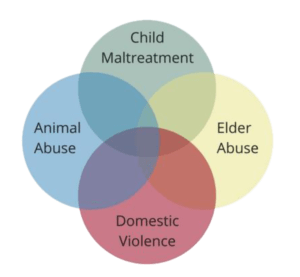HELPING THE VICTIMS OF VIOLENCE
People who own animals face additional barriers when leaving interpersonal violence. Fearing for the safety of their animals, victims often stay in a dangerous situation rather than flee without their pets. Animal safekeeping programs can provide temporary care for the pets of the victims of domestic violence who need to escape their abusive situation and have no other place for their pets.
NEW HOPE DOG RESCUE ANIMAL SAFEKEEPING PROGRAM
New Hope Dog Rescue (Saskatoon) wants to help keep people and their animals together by establishing an Animal Safekeeping Program. In October 2018 a new New Hope Dog Rescue Animal Safekeeping Program was developed.
This program provides free care for pets owned by the victims of interpersonal violence. Pets will be cared for in foster homes for up to 90 days. The foster homes have received specialized training to meet the needs of pets coming from homes where there has been violence or abuse.
This program is available at no charge for the pet owner. All necessary food and pet care supplies (e.g., bowls, leashes) are provided. Veterinary care is also available.
This animal safekeeping program has been developed to protect the safety and confidentiality of both the victims and their pets. Pets will be dropped off and retrieved from a safe, confidential location.
For safety reasons, pet owners should not be present during the drop-off/pick up process.
For the protection of the pet owner, the animals and volunteers, owners are not allowed to visit their pets while in the safekeeping program. Updates and/or photos of the dog can be provided, upon request.
Referrals from a human service professional are required to access this program.
HOW TO MAKE A REFERRAL TO THE PROGRAM
Referrals to the New Hope Dog Rescue Animal Safekeeping program may be made by a social worker, a nurse, a member of the municipal police or RCMP, or other human service professional.
All paperwork must be completed before the animal enters the program. Please allow one full business day for processing.
- Complete the referral form. The human service professional and the pet owner will have to sign this form.
- Complete the owner information form. The human service professional and the pet owner will have to sign this form.
- Have the pet owner sign the veterinary retrieval form (if applicable). By signing this form, the owner allows medical information about the animal to be released to New Hope Dog Rescue to better care for the pet.
- Make arrangements for pet drop off/pick up. The human service professional should make arrangements to transport the pet to the drop-off and pick up location. For safety reasons, pet owners should not be present during the drop-off/pick up process.
- Complete the discharge form. Indicate a tentative pick-up date on the form. If the pick-up date is not yet confirmed, leave the date blank. However, the human service professional will need to notify New Hope Dog Rescue at [email protected] at least 48 business hours in advance of reclaiming the animal. This form is completed at the time the animal is being returned to the owner.
- Fax the completed, signed forms to 1.888.761.7016 or email to [email protected]. Additional forms are available by contacting New Hope Dog Rescue at [email protected].
ANIMAL ABUSE: A FORM OF FAMILY VIOLENCE
There is a growing understanding of the interrelationship between domestic violence, animal abuse, child abuse, and elder abuse. This interrelationship is often referred to as “the Link.” According to Phil Arkow, Coordinator of the National Link Coalition, “when animals are abused, people are at risk. When people are abused, animals are at risk” (Arkow, 2013).
Animals may suffer directly from neglect or other forms of cruelty. In addition, animals can be used as a tool for the abuser to control and punish the victim. Threats of violence towards a cherished pet could prevent victims from leaving or coerce them into returning to the home. Victims may also be forced to remain silent with threats to harm the animals if the violent behaviour is reported.
Pets are seen as part of the family, making it hard for many victims of abuse to leave the home knowing their pet is left behind. Even in situations where the pet is being cared for in a safekeeping program, there can be a heart-breaking impact on the adults and children in the family as they are deprived of a valuable source of comfort during a time of stress and turmoil.
When acts of violence occur in one of these areas, it is usually not an isolated incident.
These acts are “linked.”
Graphic provided by National Link Coalition, www.nationalinkcoalition.org
HELP IS AVAILABLE
Interpersonal violence and abuse
If you or someone you know is experiencing abuse, help is available. Please visit The Saskatchewan Government’s Website for a list of programs in your area. Visit www.sk.211.ca
For emergency assistance: Call 911
Animal cruelty
If you suspect an animal is being neglected or abused, contact the appropriate authority in your area:
Animals in the following cities:
Regina Humane Society
306.543.6363
Saskatoon SPCA
306.374.7387
Prince Albert SPCA
306.763.6110
For further information on the relationship between animal abuse and domestic violence, please contact:
Saskatchewan SPCA
1.877.382.7722 (toll-free in Saskatchewan) or 306.382.7722
STOPS to Violence
306.565.3199
Provincial Association of Transition Houses and Services of Saskatchewan (PATHS)
306.522.3515
Veterinary Social Work Program
306.966.2852
Western College of Veterinary Medicine
306.966.2852
Animals (all other locations):
Animal Protection Services of Saskatchewan
1.844.382.0002 (toll-free in SK) or 306.382.0002
Livestock (anywhere in the province): Animal Protection Services of Saskatchewan 1.844.382.0002 (toll free in SK) or 306.382.0002
Emergency/after hours please contact your local police (911) or RCMP detachment at 306.975.5173